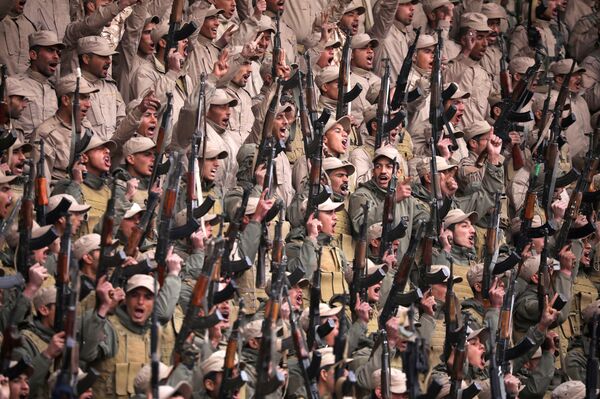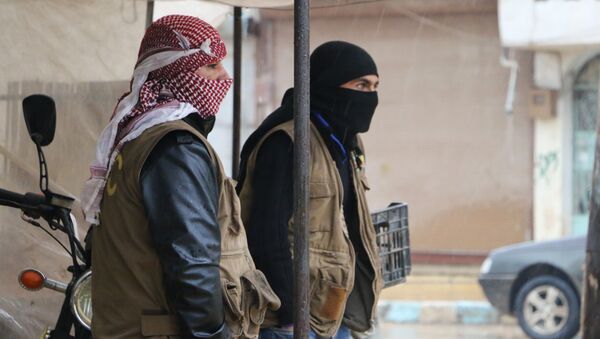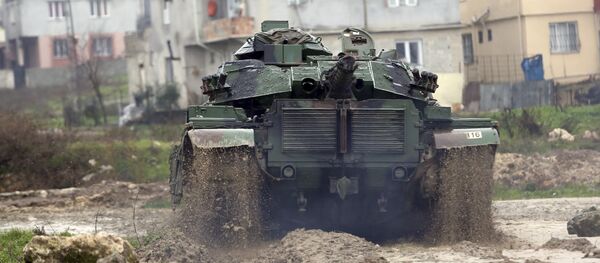Pentagon spokesman Adrian Rankine-Galloway told the state-run Turkish news outlet Anadolu Agency that any element of the Kurdish People’s Protection Units (YPG) that says "Hey, we'll no longer fight ISIS and we are going to support our brothers in Afrin" would cease to be considered a coalition partner.
"If they [US-backed units operating under the SDF umbrella] carry out military operations of any kind that are not specifically focused on ISIS (Daesh) they will not have coalition support," Rankine-Galloway said.
According to him, if "a unit of YPG says 'Hey, we'll no longer fight ISIS and we are going to support our brothers in Afrin'", it would cease to be a coalition partner.
Rankine-Galloway also pointed out that the US merely provides “training, advice and assistance” to forces that fight against Daesh, and does not issue direct orders to SDF forces on the ground.

He noted, however, that the US might stop supplying materiel to the forces that employ it for purposes other than battling Daesh.
"If we observe scenarios in which that equipment is used for other purposes, we are going to take appropriate action that could include cutting off military assistance to them," Rankine-Galloway explained.
Turkish presidential spokesman Ibrahim Kalin also remarked that the US still has not fulfilled its promise to Turkey to cease arms deliveries to the Kurdish People's Protection Units (YPG) and Democratic Union Party (PYD) in Syria.
"Earlier the United States promised that the PYD and YPG will abandon its positions in the Syrian Manbij. They gave many other promises, but did not fulfill any of them. We expect the United States to completely stop supporting YPG and PYD," Kalin said, as quoted by the CNN Turk broadcaster.
"Two months have passed since then, but nothing has changed. Turkey’s expectations are simple and precise – the cessation of support to the YPG and PYD. When it will be done, we will offer to discuss the situation in Syria," he added.
US Delegation Comes to Turkey
Less than a week after the beginning of the Turkish military operation in Afrin, a high-profile US delegation led by Deputy Assistant Secretary of State Jonathan Cohen visited Ankara.
The meeting between US officials and a Turkish group led by Deputy Foreign Ministry Undersecretary Ahmet Muhtar Gun was held at the Foreign Ministry building and lasted four-and-a-half hours, an anonymous Turkish diplomatic source told media.
READ MORE: Turkish Attack on Kurds in Syria the Result of ‘Failed’ Domestic Policy
The American delegation also attended a joint working group meeting on Syria, Iraq and the fight against terrorism at the Turkish General Staff building.
World Leaders Converse
The Turkish leader also discussed the current situation over the phone with Russian President Vladimir Putin and French President Emmanuel Macron, reaffirming his commitment to respect Syria’s territorial integrity.
'Terrorists Will Get What They Deserve'
General Hulusi Akar, Turkey's Chief of General Staff, vowed that “all terrorists” will pay the price for the blood they shed as he offered condolences to the family of NCO Musa Ozalkan, a Turkish serviceman who died during the Afrin offensive.
"All terrorists, including, Daesh, YPG, PKK, will get what they deserve and pay the price for shedding blood," General Akar said.
The First Results
The Turkish General Staff has announced that at least 260 members of the Kurdish Workers’ Party (PKK), Kurdistan Communities Union (KCK), YPG and Daesh have been “neutralized” since the beginning of the Turkish military operation in Afrin.
Turkish military casualties allegedly amount to 3 dead and one injured.
READ MORE: SDF Says it Killed Tens of Turkish Troops, Allied Rebels Since Start of Afrin Op
According to a statement issued by the military and cited by Turkish media, Ankara’s offensive in Syria’s northwest is being conducted under Article 51 of the UN Charter and within the framework of international law, and that precautions were being taken to avoid civilian casualties.
Operation Olive Branch
Ankara’s offensive against the Kurdish forces in Afrin, northwest Syria, was launched on Saturday, January 20.
Code-named Operation Olive Branch, the campaign has resulted in dozens of air and artillery strikes being carried out against positions of Kurdish-led Syrian Democratic Forces (SDF), with some 6,400 Turkish troops and thousands of Turkish-backed Free Syrian Army (FSA) militia participating in ground operations.
The Turkish side said it had informed Damascus and Moscow, its co-guarantor in the Syrian peace process, of its operation, and has taken into account the position of Tehran, the third guarantor state.
Prior to the beginning of this offensive, Turkey has repeatedly threatened to launch a military intervention in Afrin after the US announced its intent to start training a border protection force, which would include the US-backed Syrian Democratic Forces (SDF), which Ankara called a "terrorist army."



